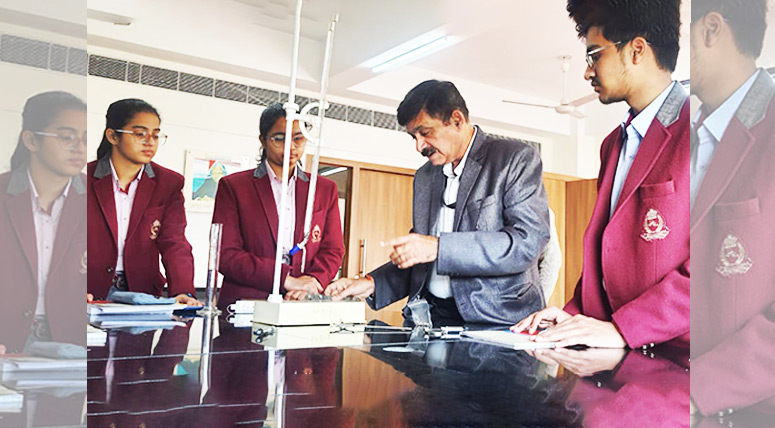Softly treading towards our destined goal, i.e. CBSE Board Examination, Session 2022-23, we bring to you precious pearls carefully gathered from the acumen of our mentors. Manav Rachna International School is one of the best International Schools where students grow holistically in an amiable, intellectual environment amidst the lap of nature. Here, a seasoned mentor shares his insight with students on how the Physics paper should be prepared~Editor
FROM THE EXPERT’S DESK
EXAM TIPS AND TRICKS TO EXCEL IN PHYSICS BOARD EXAM CLASS XII
Subject code – 042
Physics is one of the core STEM subjects in the CBSE Board Examination and other competitive exams and also among the most dreaded ones, owing to its extensive syllabus and complex concepts. Students find extremely strenuous and arduous to score high in this subject and with the CBSE board examination just around the corner, crucial planning is the need of an hour. Therefore, it’s extremely important to strategize studies so that students are benefitted the most. Moreover, knowing the weightage as per the difficulty level of the questions and the typology of the questions will aid the examinees in scoring better. To assisting the students in their preparation with great zeal, we’ve developed a few tips and tricks along with the chapter-wise weightage distribution to make them confident while attempting Physics Question paper.
Students frequently lose marks despite all of their efforts due to several typical errors. By practising all of the NCERT questions, one can minimize repeating such simple mistakes. Additionally, one must ensure that he/she fully comprehends the broad guidelines outlined in the CBSE Class 12 Physics Mock Sample Papers 2022-23. Skipping through these guidelines results in students making obvious errors.
Central Board of Secondary Education has also released the blueprint and marking scheme for Class 12 Physics Board Examination 2022- 2023. According to the curriculum, the evaluation strategy used by CBSE comprises of theoretical, formative evaluation, and practical components. Board is creating a much more efficient outcome-based evaluation to replace the evaluation that is driven by textbooks. Therefore, it is also evident in the sample question papers that there are more problem questions based on factual experiences than theories or historical facts. Question paper is divided into five sections of 35 questions for 70 marks and the complete exam pattern that has been followed is as follows-
- Section A consists of 18 Questions carrying 1 mark each [15 Multiple Choice Questions & 3 Assertion Reason based questions].
- Section B consists of 7 questions carrying 2 marks each [Very Short Answer Questions].
- Section C consists of 5 questions carrying 3 marks each [Short Answer Questions].
- Section D consists of 3 Questions carrying 5 marks each [Long Answer Questions].
- Section E consists of 2 Questions carrying 4 marks each [Case Based Questions].
Marks Distribution
Theory : 70 marks
Practical : 30 marks
Total : 100 marks
CBSE 12th Physics 2023: Topic Wise – Weightage
The following is the marks distribution for the theory paper of CBSE 12th 2023 Physics Exam by units and chapters.
| Unit /Topic | Unit/Topic Name | Weightage |
| Unit 1 | Electrostatics
• Electric Charges and Fields • Electrostatic Potential and Capacitance |
10 Marks |
| Unit 2 | Current Electricity | 6 Marks |
| Unit 3 | Magnetic Effects of Current and Magnetism
• Moving Charges and Magnetism • Magnetism and Matter |
8 Marks |
| Unit 4 | Electromagnetic Induction and Alternating Currents
• Electromagnetic Induction • Alternating Currents |
9 Marks |
| Unit 5 | Electromagnetic Waves | 2 Marks |
| Unit 6 | Optics
• Ray Optics and Optical Instruments • Wave Optics |
16 Marks |
| Unit 7 | Dual Nature of Radiation and Matter | 4 Marks |
| Unit 8 | Atoms and Nuclei | 8 Marks |
| Unit 9 | Electronic Devices
• Semiconductor Electronics: Materials, Devices and Simple Circuits |
7 Marks |

Tips to Ace 12th Physics CBSE Board Exam Session 2022-23
- Start your preparation with the NCERT textbook and its solutions. If you don’t have much time, you can skip other resources, but NCERT is a must.
- Practice as many questions as possible. Start with easier ones, then move on to the difficult ones. It will be less pressurizing for your brain, giving it scope to adjust to the difficulty level.
- Ensure to pay more attention to the chapters that carry high weightage.
- Make a separate Derivation Notebook. Write down all the derivations and ensure to revise them time to time. You should repeat the derivations three to four times in order to appear extremely fast in the examination room.
- After revising a chapter, make a formulae list and make sure that these formulae should be on your fingertips. If you choose to skip the numerical portion of a physics exam, you will not do well. Give yourself some time to grasp the numerical aspects if you feel intimidated by them. If you’re still doubtful about the numeric section, make doubly sure that you possess a firm grasp of the theoretical part.
- It’s imperative to practice previous years’ question papers to get a clear idea of the type of questions asked in the exam. Not only it’ll help you being acquainted with the paper pattern, but you also learn time management skills, which is very important for success in board exams
- While CBSE Board and Competitive Exams demand rigorous revision and studies, it is important to take a break in between few hours to relax your mind and body.
- Last but not the least, students need not strain themselves to study hard for scoring good marks in exams, but adding a few good habits and adjustments can help them in studying better and scoring good marks in Board Exam.
With these tips in mind, I would like to wish all my students All the Best for their upcoming CBSE Board Exam.
Author: Mr Sharwan Chhabra, PGT, PHYSICS, MRIS – 14






